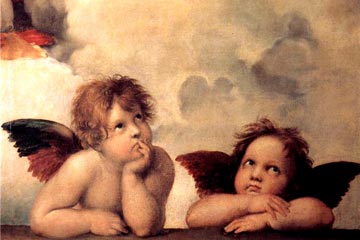Many people take it as a matter of course that when we die, if we are good, we will become angels in heaven. There are many Christians, on the other hand, who believe that angels are members of a superior race of spiritual beings, who were created before the world began. Some even picture angels, as having wings and living among the clouds. This concept of angels, however, is not solidly based on the Bible. In fact, the Bible gives us quite a few reasons for believing that angels are simply people who have died and gone to heaven.
One reason is that the Bible calls angels "men" or "people." For example, we are told that "the man Gabriel" appeared to Daniel (Daniel 9:21). Angels were also called people when they appeared to Abraham (Genesis 18:2), Joshua (Joshua 5:13), Manoah's wife (Judges 13:6), Ezekiel (Ezekiel 9:2,3), Zechariah (Zechariah 1:8, 11), and the women at the sepulcher (Mark 16:5, Luke 24:4, John 20:12).
A second reason is that angels look like people. There is no mention in the Bible of angels having wings. In fact, when angels appeared to Abraham and Lot, they did not look any different from other people. The people who saw them did not even realize that they were angels. That is why Paul says, "Do not forget to entertain strangers, for by so doing some have unwittingly entertained angels" (Hebrews 13:2). The only thing which might distinguish angels from people in appearance is that sometimes the face and clothes of angels appear shining (Daniel 10:6, Matt 28:3, Luke 24:4). This does not mean angels are a different race. Moses' face also shone after speaking with God (Exodus 34:29), and Jesus said that after death all good people will "shine forth as the sun in the Kingdom of their Father" (Matthew 13:43).
A third reason for believing that angels and men are the same race is that both are described in the same terms. In both Hebrew and Greek, the words for "angel" simply mean "messenger." When people from the spiritual world appeared, they usually brought messages from the Lord, so they were called "messengers" (Greek angeloi). Being an angel is a matter of one's function or office, not one's race. In this respect the word "angel" is like the words "king" and "prophet"--it describes the person's function. In fact, since the word for angel means "messenger" it is used to describe people on earth who are messengers. For example, Haggai and John the Baptist were called messengers or "angels" of the Lord because they spoke for Him (Haggai 1:13, Malachi 3:1).
Sometimes the Bible uses special names to refer to angels, such as "the holy ones" (Daniel 4: 13,17), "the sons of God," or even "gods" (Psalm 8:5). Yet people still on earth are also called "holy ones" (Psalm 30: 4 and many other places, usually translated "saints"), "sons of God" (John 1:12, 1 John 3:1-2), or even "gods" (Psalm 82:6). In short, the words used to describe angels are also used to describe people on earth.
A fourth reason is that angels themselves reject the idea that they are superior beings. When the apostle John fell at the feet of an angel to worship him, the angel said, "See that you do not do that! I am your fellow servant, and of your brethren who have the testimony of Jesus. Worship God!" (Revelation 19:10). Later John echoes this idea when he speaks of "The measure of a man, that is of an angel" (Revelation 21:17).
A fifth reason to believe that angels were not created as a separate race is that the Bible never mentions angels being created, even though the creation story carefully includes everything else in creation: sun, moon, stars, people, animals, birds, plants, ocean, fish, even insects and worms. But no angels! (Genesis 1). The reason is that people were created to become angels.
A sixth reason to believe that people become angels after death is that Jesus Himself said that those who are worthy become after death "equal to angels" (Luke 20:36, Matthew 22:30, Mark 12:25), and would have similar powers (Luke 10:17,19; Mark 16:17,18; 11:23; John 14:12).
To sum up, there are many reasons to believe that people become angels after death:
- The Bible calls angels "people."
- Angels look just like people.
- The words that refer to angels also refer to people.
- Angels are our fellow servants and brothers.
- The Bible never mentions the creation of angels.
- We become just like the angels after death.
It is understandable that some people would think that angels are superior beings, since they do have power and radiance that surpasses what we experience on earth. However, the Lord has infinite love for people and He wants to give all of us the same glory and happiness that people have sometimes seen when angels have appeared to people on earth. When we let Him live within us, we can all be transformed into such superior beings and become angels after death.





